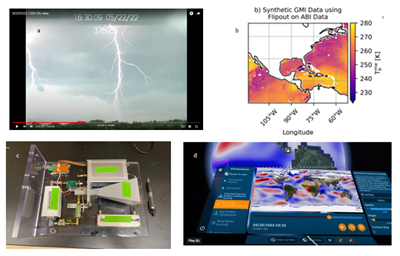First CISESS Seed Grants Announce Results

(a) Lightning Cameras; (b) PMW Emulator; (c) Student-Built Radiometer; (d) Virtual Reality Interface
© CISESS
CISESS Seed Grant Program: Results of 2022 Awards
CISESS is proud to announce the results of its first four Seed Grants, awarded in 2022. The awards went to four projects.
(1) Real-Time NOAA Weather and Climate Product Analysis in Virtual Reality: Guangyang Fang & Joseph Patton and two student interns have developed a remote streaming VR interface to view 100 years of 3D climate data on ENSO. For more on this project's results, go to Virtual Reality.
(2) Building & Deploying Tools to Better Observe Lightning in the Washington D.C. Region & Beyond: Daile Zhang has designed a new low-cost Raspberry Pi camera lightning monitor. With the help of her three student interns, she set up six sites in three states. See Lightning Cameras for more information.
(3) Emulating Satellite Passive Microwave Brightness Temperature from the GOES Advanced Baseline Imager: Veljko Petkovic and Malarvizhi Arulraj, with the help of PhD student, have developed a passive microwave emulator from ABI data using artificial intelligence/machine learning. See PMW Emulator for details.
(4) Developing a Low-Cost Microwave Radiometer for Student Training and Supporting JPSS Programs: Hu Yang and Jun Dong helped five student interns build and test a microwave radiometer. This Seed Grant also funded the development of the new CISESS Remote Sensing Laboratory. Their results are at Student-Built Radiometer.
The second year of the CISESS Seed Grant Program is already underway! The four proposals selected this year are:
-
Hu Yang and Jun Dong, Improvements to the Remote Sensing Laboratory for Student Training and Supporting NOAA's JPSS Program;
-
Malar Arulraj and Veljko Petkovic, 3D-VisSys: Three-Dimensional Weather Visualization System For Maryland-DC Region;
-
Xi Shao, Enhancing CISESS Remote Sensing Laboratory to Support Calibration and Validation using Field Campaign for JPSS/VIIRS and GOES/ABI; and
-
Peter Beierle, Development of an Improved CO2 Trace Gas Retrieval Product from Hyperspectral Infrared Data Using Machine Learning.
« Back